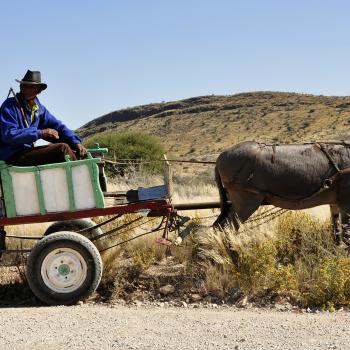I’ve been saying since the beginning of this book that Clark is a good person. I got a bit of pushback on that last week. A reader noted that Clark told Marty that he “would be obliged” if she would have Missie call her Mama—a comment that Marty smarted at but interpreted as a command—almost immediately after telling Marty that he wouldn’t rush her.
I’ve been thinking about this, because in this week’s chapter, Clark is a terrible, horrible, very bad person. I think I’ve been beating the “Clark is an awesome person” tattoo in part because I’ve been comparing him to Marcus in A Voice in the Wind and Cooper in Forbid Them Not. I’ve also been impressed by how Oke discusses Clark’s’ own loss—he really does seem to understand Marty’s.
Clark’s central flaw is that he has coerced a complete stranger with plans to travel thousands of miles away come spring into promising to adopt his toddler. I’ve always seen this as something Oke devised for the sake of the plot and forced on Clark, because he has always seemed like such a loving father. Why would he hold onto Missie after Ellen’s death and then send her away with a stranger? It didn’t make sense! In this chapter, though, it almost does make sense.
At the end of the last chapter, Marty woke up after the first night in her new home and went looking for food to fix. She set out the ingredients for pancakes, and then found bacon and eggs in a cooling device in the shed attached to the kitchen. That’s where this chapter picks up.
Marty had just turned back to mixing her pancakes when she heard Missie stirring. Best get her up and dressed first, she decided, and she left her ingredients and bowl on the table. As she appeared at the bedroom door, Missie’s bright smile above the crib railing faded away, and she looked at Marty with surprise, if not alarm.
Wow, Oke really is picturing a conventional modern crib. Okay then.
Can we take a moment to sympathize with Missie? She’s a few months shy of her second birthday. She lost her Mama about six months before this. She has gone everywhere with her Pa since then, and now this complete stranger shows up—and where is her Pa?
Marty finds Missie’s clothes in a small chest and pulls out an outfit.
Marty returned to the tiny one who, wide-eyed, was watching every move. Marty laid the clothes on the bed and reached for Missie, but as the child realized this stranger was about to dress her, she made a wild grab for her shoes and began screaming.
Marty was sure her shrieks would pale a ghost.
“Now, Missie, stop thet,” she scolded, but by now the little girl was howling in either rage or fright, Marty knew not which.
“I wan’ Pa,” she sobbed.
At this, Marty picks up both Missie and her clothes, puts them in a corner in the kitchen.
“Missie possessively pulled her clothes to her, still sobbing loudly.”
This poor, poor child.
Marty returns to making breakfast, but everything seems to go wrong—the stove is too hot, the coffee boils over, and and she can’t find a rag to clean anything up.
It was to this scene that Clark returned. He looked from the distraught Marty, who had by now added ab urned finger to the rest of her frustrations, to the screaming Missie in the corner, still clinging furiously to her clothes.
Does Clark pick Missie up? No. No, he does not.
“She wouldn’t let me dress her,” [Marty] told him, trying to keep her voice even. “She jest set up a howlin’ fer her pa.”
I’m trying to imagine how I would respond if a babysitter tasked with watching my one-year-old gave this explanation for why my child was not yet wearing pajamas when I returned, offered in this tone, with such utter lack of sympathy. That babysitter would not be coming back. Marty doesn’t seem to actually care about Missie’s feelings. And you know what? Clark doesn’t either.
Marty wasn’t sure how she expected Clark to respond, but certainly not as he did.
“I’m a feared a child’s memory is pretty short,” he said, so calmly that Marty blinked. “She already be fergetting’ what it’s like to have a mama.”
Bullshit. That’s not the problem here. The problem is that Marty is a complete stranger. Missie needs some time to get used to her. Toddlers become attached to their caregivers, and right now, Missie only has one—Clark. Missie needs time to develop an attachment to Marty.
He moved toward the cupboard, not even glancing Missie’s way, Marty noted, lest it encourage her to a fresh burst of tears.
I put my oldest in daycare when she was about Missie’s age, and it was hard. For the first week, she cried each day when I left her. In part, it has to do with their age. When I had my second child, my daughter’s daycare advised me to start him before he reached nine months, because after that children develop a stronger sense of separation anxiety. I did, and he was fine. There’s something about that period between one and two, though, where kids cling closely to caregivers they know.
Neither of the adults in the picture here seem to actually care what Missie is going through. Marty is annoyed, and Clark is stone cold.
“She’ll jest have to learn thet ya be her mama now an’ thet ya be in charge. Ya can take her on back to the bedroom an’ git her dressed an’ I’ll take over here.” He motioned around the somewhat messy kitchen and the partially prepared breakfast. Then he opened a window to let some of the heat from the roaring stove escape, and he did not look at either Marty or Missie again.
Stone cold.
So Marty takes Missie back to the bedroom.
“Now, you look,” Marty said through clenched teeth, “remember our bargain? I said iffen ya be good, I’ll be yer mama, an’ this ain’t bein’ good.”
Marty made this “bargain” with Missie while standing over her the night before while she slept in her crib, so no, she doesn’t remember it. She also never agreed to it.
But Missie wasn’t listening.
No shit.
Marty deposited her on the bed and was shocked to hear Missie clearly and firmly state between hiccuping sobs, “I … wan’ … Mama.”
So she does remember. Marty’s cold anger began to slowly melt. Maybe Missie felt the way Marty did about Clark—angry and frustrated.
So, first, Oke confirms that Marty in fact was angry at Missie. It’s only here that she realizes that Missie has—gasp—feelings. This whole section is just disturbing. When I feel angry enough at my kids that I’ve got my teeth clenched, I know it’s time to walk away and cool down.
She didn’t really blame the little one for crying and kicking. She would be tempted to try it herself had not life already taught her how senseless and futile it would be.
Oh, Missie, she thought, I knows how ya be feelin’. We’ll have to become friends slow like, but first—she winced—first, I somehow have ta git ya dressed.
Marty, this section suggests, finally feels some compassion for Missie. The problem is that she still has to get Missie dressed. For all his “we’ll take things slow,” Clark has made it very clear that neither of them can leave the room until Missie is dressed.
Theoretically, Marty could bring Missie out and say “hey Clark, she’s just scared and needs some time to get used to me, I think you should dress her this time, and I’ll finish breakfast.” Given how stone-cold Clark was to Missie when he came in—refusing to even look at the sobbing child as she clung to her clothes—Marty would have good reason to worry about his reaction.
Marty can’t exactly just wait Missie out, either, because Clark isn’t going to eat breakfast without them, and would probably get upset if the rest of his chores were kept waiting—and again, given how stone-cold he just was, if I was Marty, I’d be a little bit afraid of him right now.
None of this is to condone what Marty is about to do. I’m simply noting that Clark has put her—and Missie—in an impossible situation. This is making me rethink my feelings about Clark. When I first reread the book, I saw this as more Oke inserting her agenda than as Clark. Now I’m not so sure.
[Marty] sat down and took the fighting child on her knee. Missie was still throwing a fit. No, now it wasn’t fear. Marty could sense that it was sheer anger on the child’s part.
Missie is not “throwing a fit.” She is scared and confused and she wants her Pa, and he refused to even look at her, and is it any surprise she’s crying and upset?
Marty decides, after putting Missie over her knee, that Missie isn’t scared, she’s angry. So glad Marty can now read Missie’s emotions. Yes, I’m being sarcastic. Because she can’t.
If descriptions of adults hitting children bother you, you may want to skip this next section.
“Now, Missie, ya stop it.”
Marty’s voice was drowned out by the child’s, and then Marty’s hand smacked hard, twice, on the squirming bottom. Perhaps it was just the shock of it, or perhaps the child was aware enough to realize that she had been mastered. At any rate, her eyes looked wide with wonder and the screaming and squirming stopped. Missie still sobbed in noisy, gulping breaths, but she did not resist again as Marty dressed her.
Mastered? So much of the language we use to talk about children and their discipline is sadistic and sick. And yes, if you remember reading Debi Pearl, you’ll find much of this familiar. Spanking is treated as a magical cure-all that turns an unruly brat into an obedient angel. Unaddressed is what is actually going on—the child is learning that if they do not behave just so, the adults around them will administer pain to their bodies. It’s no wonder poor Missie went slack.
When the battle was over, the child was dressed, and Marty felt exhausted and disheveled.
Okay, but how did Missie feel? I am so tired of parents only considering parent feelings when it comes to parenting challenges. I’m reminded of that meme of a positive parenting meme I can’t find right now, which pictures a distraught toddler and the words “I am not a problem. I am having a problem.” But no, what matters here is how Marty feels.
Also, note the use of the term “battle.” Any time an interaction with my kids starts to feel like a battle, I take a step back. We’re in this together, parent and child. Viewing parenting as a battle, rather than as a cooperative enterprise, is exhausting—and counterproductive. I could write an entire blog post about just this, and maybe I will, but not right here and not right now.
Meanwhile, in the book:
The two eyed each other cautiously.
“Ya poor mite,” Marty whispered and pulled the child close. To her surprise, Missie did not resist but cuddled in Marty’s arms, allowing herself to be held and loved as they rocked gently back and forth. How long they sat thus Marty did not know, but gradually she realized the child was no longer sobbing.
See! Spanking works! It worked in a made-up story, so it works! Or, you know, maybe Missie is just in a state of shock.
Marty freshens up and cleans Missie’s face and takes her out to the kitchen, where Clark once again does not look up. The food is ready, so Marty sits Missie at the table and sits down herself.
At this point, I’d be scared of Clark. What, he can’t even greet Missie and Marty when they return from the bedroom? What gives?
Marty remembers Clark’s prayer the night before, so rather than digging into the food, she closes her eyes and bows her head.
Nothing happened. Then she heard faint stirrings—like the sound of pages being turned. She stole a quick glance and saw Clark, Bible in hand, turning the pages to find the place he wanted. She could feel the color rising slowly in her cheeks, but Clark did not look up.
“Today we’ll read Psalm 121,” he said, and began reading.
Okay, first of all, the custom at the time was to read the Bible together as a family in the evening, after dinner. Second, though—he couldn’t even warn her? He couldn’t say “hey, just so you know, I have a custom in this home where I read a chapter of the Bible aloud every day at mealtime. I hope that’s okay with you. I know we’ll have to blend some traditions, but this is one I want to keep.” But no, instead he just keeps catching her off guard with things like this, and she doesn’t like it.
“‘I will lift up mine eyes unto the hills, from whence cometh my help.'”
Marty solemnly wished her help would come from the hills. In fact, she’d take it from any direction.
Send help for Missie, too, poor kid.
After he finishes the chapter, Clark puts the Bible away on a shelf and immediately bows his head and prays, again catching Marty off guard, much to her chagrin.
“Our God, fer this fine day an’ yer blessin’s, we thank ya.”
Blessin’s, thought Marty. Like a howlin’ kid, spilled coffee, an’ a burned finger? Blessin’s like that I can do without.
But Clark went on. “Thank ya, Lord, thet the first hard mile with Missie be traveled, and an’ help this one who has come to be her new mama.”
Stone. Cold.
It’s only once Bible reading and prayer are over that Clark turns to Missie, fixing her pancake. Missie, though, is quiet, “probably too spent from her morning struggles to be chatty.” Or maybe she’s still scared of all these people who suddenly acted like they didn’t care a whit about her or how she felt.
As they eat Marty’s mind wanders as she tries to figure out what to do after breakfast. What to do? This is a pioneer homestead! She ends up concluding that after she cleans the stove and sweeps, she’ll wash her clothes and quilts—everything that was in her trunk—and maybe mend her dresses. Is there no butter to churn? Does Clark not have a backlog of things that need doing?
She stole a glance at [Clark] and then quickly looked back at her plate. He certainly did not look like a happy man, she told herself. Brooding almost, one could call it. At any rate, deep thinking, as though trying to sort through something.
Then Missie cut in with a contented sigh and a hearty, “All done, Pa.” She pushed her plate forward. The face was transformed.
“Thet’s Pa’s big girl.” He smiled lovingly, and the two shared some chattering that Marty made no effort to follow.
I get that we’re probably supposed to think that Clark is broody because he’s thinking about Ellen, but after his stone cold approach to Missie earlier, it suddenly feels more sinister.
Like maybe he’s actually a serial killer. Has Marty even asked how Ellen died? Maybe it was under mysterious circumstances. Maybe she was too easy on poor Missie for Clark’s liking.
At this point Clark begins a long narrative about everything they have at the farm—the root cellar, the smokehouse, the game they’ll kill once it’s cold and the fish in the “crik.”
“We have us real good land and the Lord be blessin’ it. We’ve had good crops fer the last four seasons. The herd has built up, too, and the hogs an’ chickens are plentiful enough.
The timeline here is weird. A few more chapters in, what would have been Ellen’s 21st birthday arrives. But here, we’re told that they’ve had good crops “fer the last four seasons.” That almost seems to imply that they’ve had more than four seasons here, but let’s imagine that it’s just four. If he and Ellen came out together, the first harvest would have been got in the summer when she was 16, which means they’d have had to come in a wagon train (in the summer) when she was 15.
Either Clark married Ellen really young, or Clark came out before Ellen and met her here—in which case, where is her family? Or—the final alternative—Oke never thought her timeline through. It’s odd. Why have Ellen be so young in the first place?
The other odd thing, here, is something a number of readers have pointed out—Clark has all the different types of framing at once. He’s a crop farmer, and a rancher. And he’s got hogs. You could theoretically do all these things at once—though having crops and a herd is still odd—but you’d expect a farm of this size to have some hands on it. It’s not something one person could manage alone. If he doesn’t have any half-grown sons, Clark would need to have some hired men.
Add to this the oddness that we never hear about Marty milking the cows or churning butter. Or canning, for that matter. She doesn’t even feed the chickens. Clark does all of the out-of-the-house chores. The only out-of-the-house thing Marty manages is the vegetable garden, come spring.
Each day, Marty casts about for things to do, and I kid you not, she quickly runs out. She has to start creating make-work. We’ll get there. This makes no sense at all.
So not only does Clark manage this entire farm without any hired hands, he also manages it solo. Marty does the cooking (well, only pancakes), patches the clothes, and that’s about it. Even her decision to launder her personal clothes and quilts feels odd—wouldn’t there be more clothes than that to launder? Who has been doing the laundry since Ellen died? Laundry was a time-consuming job, before mechanization; one day a week would often be given over entirely to laundry.
But no. Marty runs out of things to do.
“We’re better off than a lot of folks, but the neighbors round about here are makin’ good, too. Seems as how our move to the West’s been a good one.”
“Our” move definitely makes it sound like Clark didn’t start out out here. He isn’t managing a farm his father started thirty years prior. This is a story that’s missing an actual history. I’m interested in why Clark moved west, for example. Is that so much to ask?
Clark has been talking for a while now, and he pauses to explain to Marty that he’s telling her this so that she knows that if she needs something, she can ask for it and they’ll get it. He says they have some cash, and that if they need more, they’ll sell a hog. So, the sky’ the limit.
“We’ve got a couple o’ good milk cows at present an’ another due with an off-season calf, so we have all the milk an’ butter we be needin’. There’s a good team of horses an’ a ridin’ horse, too, iffen ever ya want to pay a visit to a neighbor’s.”
I have a question. Who is churning the butter?
This whole “I’m giving you the lay of the land” conversation ought to include things like: “Let me take you out and show you the cows, they’ll need milking each morning, the can hangs here, the butter churn is right over here. The chickens need feeding too, and the eggs need gathering—let me show you where the hens nest. As for laundry, I’ll show you where the tub is, we usually get the water from the creek and warm it up right here, the lines for hanging it out are over here. When the time comes to do some canning, Ellen generally asks Ma Graham to send up one of her girls. With Ellen gone, Ma Graham sent up two of her girls last month, and they put up much of the garden produce, so we’ll have it to eat come winter.”
But no. Instead, “I’m giving you the lay of the land” consists of “we are doing well for ourselves and even have some cash, if you need anything let me know and I’ll buy it for you.”
If Oke wants to give Marty this whole helpless “I don’t know how to cook” storyline, she could do it in a much more realistic way—have Clark take her out to show her where the cows are only to learn that she’s never milked a cow or churned butter in her life. Maybe she lived in town. There are a million believable ways to arrive at Marty not knowing how to do framework.
Oh, and it’s not just his own work that Clark does solo.
“I plan to spend a few days helpin’ one o’ the neighbors who ain’t through yet. He got ‘im a slow start. Plan to go over there today—Jedd Larson—an’ give ‘im a hand. I’ll be asked to stay to dinner with ’em so won’t be home ’til chore time. Ya can make yourself to home, an’ you an’ Missie git to know one another like, an’ maybe we won’t have any more of those early mornin’ fusses.”
This was actually the perfect solution for helping Missie acclimate all along, and they completely blew it. Clark could have gotten Missie dressed this morning, and could have spent the whole time—and breakfast—telling her how he had to go help out at Jedd’s, but Marty is new here and doesn’t know where anything was, and it’s Missie’s job to stay here and be her special helper. Maybe Missie could start by showing Marty her chickens? Pa knows how much Missie loves her chickens!
Sure, Missie still would have cried when her Pa left without her, but she’d already have gotten a healthy dose or his attention, and she’d be at least slightly prepared. And it would have given Marty a script for involving Missie, during their first day on their own. Clark could again shower Missie with attention in the evening, and then the next morning, before leaving again to help Jedd (he spends much of the week there). By the time Clark went back to working closer to home, Missie would have grown used to Marty, without any need to stage “battles” between them.
Clark leaves. Marty is determined.
She had never had much practice at keeping a real house, but she was determined she would do a good job of it.
How in the world has she not had much practice at keeping house? She’s a 19-year-old woman living in the United States in the 1850s or 1860s. Unless she had a very odd childhood—in which case, I’d like to hear about it—all she’s done is practice keeping house.
Besides, this isn’t really about “keeping house.” This is a farm, with crops and a herd to end and cows to milk and a garden to keep, and Marty would have been expected to play an active role in the entire thing, not just the cooking and the mending.
So, there you have it. Clark is stone cold, Missie is being put through the wringer, and nothing about this farm functions the way it should. Maybe it’s a magical farm.
I have a Patreon! Please support my writing!















